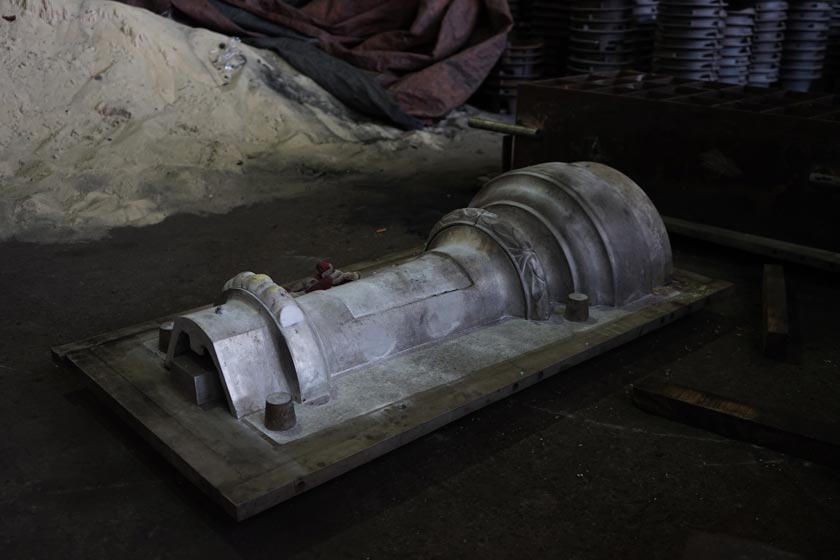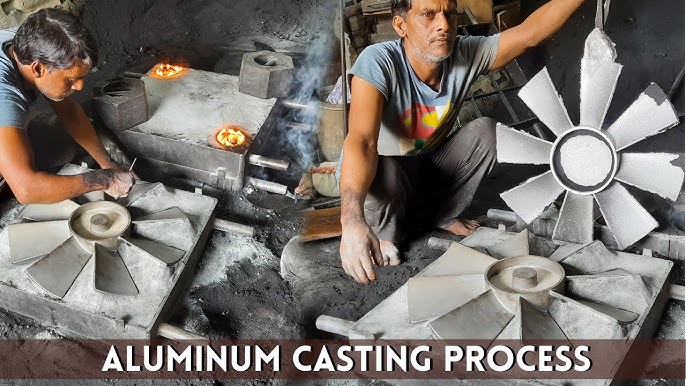Learn the value of Aluminum Foundry Wisconsin for today’s casting projects
Wiki Article
How Aluminum Foundry Adds to Advancements in Aerospace Engineering
Aluminum shops are indispensable to improvements in aerospace engineering. They generate lightweight, high-strength components that are essential for modern-day aircraft. Through innovative spreading methods, these factories develop intricate geometries that boost architectural integrity. In addition, the advancement of exceptional Aluminum alloys sustains the market's emphasis on fuel performance and sustainability. Nevertheless, difficulties remain in the manufacturing process. Comprehending these elements exposes the extensive influence of Aluminum on aviation's future.The Importance of Lightweight Materials in Aerospace Layout
As the aerospace sector proceeds to develop, the importance of light-weight materials becomes progressively noticeable. The demand for performance and sustainability drives engineers to prioritize making use of products that decrease general weight without endangering structural stability. Light-weight materials, especially Aluminum, play a vital duty in boosting gas performance, improving haul ability, and raising the general performance of aircraft.The integration of these products allows for cutting-edge layouts, allowing makers to produce even more wind resistant forms that can stand up to extreme conditions. The reduction in weight not only reduces functional expenses however likewise contributes to a decreased environmental impact, lining up with global initiatives toward sustainability in air travel.
Advanced Casting Techniques in Aluminum Foundries
Advanced spreading techniques in Aluminum foundries play a critical function in aerospace engineering by making it possible for the production of accurate and lightweight parts. Technologies in mold layout and precision spreading procedures are necessary in accomplishing optimal performance and architectural stability. In addition, the growth of light-weight alloys boosts the overall efficiency and effectiveness of aerospace applications.Cutting-edge Mold And Mildew Layout
Ingenious mold and mildew design plays a vital duty in the effectiveness and efficiency of Aluminum shops, particularly within the aerospace industry. By leveraging sophisticated products and methods, modern-day mold and mildews can be crafted to stand up to high temperature levels and pressures, making sure peak performance during the casting process. These designs typically integrate intricate geometries that permit for the production of lightweight yet structurally sound parts, crucial for aerospace applications. Furthermore, using computer-aided design (CAD) software application promotes accurate modeling, making it possible for factories to refine and replicate mold styles prior to physical production begins. This not just improves the high quality of cast parts however also lowers waste and lead times, leading to substantial expense savings. Overall, ingenious mold layout is a cornerstone of progress in Aluminum Foundry modern technology for aerospace design.Accuracy Casting Processes
The efficiency of innovative mold designs flawlessly incorporates with precision casting procedures, which are necessary for creating premium Aluminum elements in aerospace engineering. These processes, including sand casting, die spreading, and financial investment casting, ensure the production of complex geometries with limited tolerances. Advanced strategies like vacuum cleaner spreading and stress die casting enhance the stability and surface finish of the last items. Accuracy casting decreases product waste while maximizing the mechanical residential or commercial properties of Aluminum, critical for aerospace applications. On top of that, employing real-time tracking and progressed simulation tools throughout the casting procedure enables for immediate changes, resulting in enhanced high quality control. Collectively, these precision spreading procedures placement Aluminum shops at the center of aerospace development, supporting the industry's need for integrity and performance.Lightweight Alloy Advancement
As aerospace designers seek to enhance fuel performance and performance, lightweight alloy advancement becomes a vital emphasis in Aluminum factories. These foundries use advanced spreading methods to develop alloys that give premium strength-to-weight proportions. Developments in alloy composition, including the consolidation of aspects like lithium and magnesium, allow the production of products that hold up against extreme problems while minimizing overall airplane weight. Techniques such as die casting and financial investment casting assist in the precision manufacturing of complicated forms, which are essential for aerospace applications. Furthermore, recurring research study intends to enhance these alloys for boosted mechanical residential or commercial properties and raised toughness. By prioritizing lightweight alloy advancement, Aluminum factories substantially add to the development of aerospace design, leading the way for much more reliable and lasting airplane designs.
Enhancing Structural Stability Via Aluminum Elements
Aluminum parts supply substantial advantages in improving structural honesty within aerospace engineering. Their lightweight nature contributes to general performance while maintaining toughness, which is essential for airplane efficiency. Additionally, the stress resistance residential properties of Aluminum assistance assure the sturdiness and reliability of aerospace structures under different operational conditions.
Lightweight Product Advantages
While traditional products usually endanger weight for strength, using Aluminum parts in aerospace design offers significant advantages in structural stability. Aluminum's lightweight nature adds to total layout efficiency, permitting more streamlined airplane that eat less fuel, thereby boosting sustainability. The material's superb strength-to-weight ratio warranties that elements keep durability without including unneeded mass. This quality fosters boosted efficiency and agility in trip, along with maximized payload capabilities. Furthermore, Aluminum's resistance to corrosion extends the lifespan of aerospace frameworks, lowering maintenance costs and boosting safety and security. As manufacturers progressively embrace Aluminum alloys, the aerospace sector experiences a transformative change towards a lot more effective and reliable engineering options that prioritize both efficiency and ecological responsibility.Stress And Anxiety Resistance Properties
Although numerous products possess distinct residential or commercial properties, Aluminum's remarkable stress and anxiety resistance stands apart as a crucial consider boosting the architectural integrity of aerospace elements. This resistance plays a vital function in ensuring that aircraft can withstand various operational anxieties, consisting of tiredness, effect, and ecological conditions. Aluminum alloys, especially crafted for aerospace applications, show high tensile stamina while preserving lightweight attributes, making it possible for designers to design much more efficient structures - Aluminum Foundry. Furthermore, the capability of Aluminum to withstand cyclic loading without considerable contortion adds to the durability and reliability of aerospace components. As improvements proceed in Aluminum Foundry strategies, the development of stress-resistant Aluminum elements guarantees additional renovations in performance, safety and security, and performance throughout the aerospace market, solidifying Aluminum's duty as a favored material in modern designFuel Efficiency Improvements Driven by Aluminum Innovations
As the aerospace industry looks for to enhance gas efficiency, ingenious uses Aluminum have become a necessary option. Aluminum's lightweight nature especially lowers aircraft weight, enabling reduced fuel intake throughout flight. This decrease in weight is crucial, as even small declines can cause considerable improvements in general fuel economy.Advanced Aluminum alloys, designed for boosted stamina and longevity, make it possible for suppliers to develop components that keep structural honesty while lessening mass - Aluminum Foundry. Additionally, the assimilation of Aluminum in airframes and engine components assists in improved the rules of aerodynamics, adding to minimized drag and increased effectiveness
The fostering of Aluminum in aerospace not only satisfies the demand for fuel-efficient layout but likewise aligns with regulative stress for reduced discharges. As these technologies continue to evolve, they play a substantial function in establishing click for info brand-new benchmarks for gas efficiency, making sure that the aerospace sector can satisfy expanding ecological and economic challenges.

The Duty of Aluminum in Sustainable Aviation Practices
The increasing emphasis on sustainable aviation practices has positioned Aluminum as a vital product in the mission for greener airplane style. Understood for its light-weight buildings, Aluminum substantially lowers aircraft weight, causing reduced gas consumption and emissions. Its recyclability better boosts its sustainability account, as Aluminum can be reused forever without loss of high quality. This characteristic supports a round economy within the aviation sector, reducing waste and resource deficiency.Moreover, advancements in Aluminum alloys have improved their toughness and rust resistance, enabling longer service life and lowered upkeep requirements. These advancements help with the growth of a lot more effective aircraft frameworks, contributing to total sustainability efforts. In addition, Aluminum's thermal conductivity plays a vital duty in energy-efficient designs, improving systems such as warm exchangers. Collectively, these characteristics emphasize Aluminum's essential duty beforehand lasting aviation, lining up with international efforts targeted at decreasing the ecological influence of air traveling.
Challenges Encountered by Aluminum Foundries in Aerospace Manufacturing
While Aluminum foundries play a crucial role in aerospace manufacturing, they read the article deal with considerable difficulties that can affect manufacturing effectiveness and high quality. One significant obstacle is the strict quality assurance standards called for in the aerospace sector. Any type of flaw can compromise safety and security and performance, requiring strenuous evaluation processes that extend manufacturing timelines. Additionally, shops typically emulate fluctuating raw material costs, which can affect pricing and success. The complexity of Aluminum alloys used in aerospace applications more makes complex the production process, as accurate formulas are important for attaining wanted mechanical homes. Additionally, skilled labor lacks impede the capability to keep top notch manufacturing degrees. Ecological laws enforce constraints on exhausts and waste administration, requiring shops to invest in sustainable methods, which can be cost-prohibitive. These variables collectively create a landscape where Aluminum shops need to constantly adjust to fulfill the advancing needs of aerospace production while making certain security and compliance.Future Fads in Aluminum Applications for Aerospace Design
With advancements in technology and raising needs for efficiency, the future of Aluminum applications in aerospace design is poised for significant transformation. The assimilation of cutting-edge Aluminum alloys and compounds is anticipated to enhance strength-to-weight proportions, resulting in even more fuel-efficient aircraft layouts. Additionally, advancements in additive production techniques will certainly permit the manufacturing of complicated Aluminum frameworks that were previously difficult, enhancing performance and lowering waste.
Sustainable methods will play an essential duty, with a growing emphasis on recycling Aluminum to reduce ecological influence. The aerospace sector is likely to accept smarter producing procedures, such as automation and expert system, guaranteeing better and accuracy in Aluminum parts. Furthermore, cooperations between Aluminum foundries and aerospace firms will foster r & d, paving the method for new applications that satisfy the rigid needs of modern-day aerospace design - Aluminum Foundry. Generally, the future looks guaranteeing for Aluminum's function fit the skies
Frequently Asked Questions
What Are the Environmental Influences of Aluminum Production in Aerospace?
The ecological effects of Aluminum production in aerospace include significant power consumption, greenhouse gas emissions, and environment disruption. In addition, mining processes can result in soil destruction and water contamination, increasing issues regarding sustainability and environmental balance.How Does Aluminum Compare to Other Products in Aerospace Applications?
Aluminum offers a special combination of light-weight properties, rust resistance, and cost-effectiveness compared to various other products. Its high strength-to-weight proportion makes it specifically beneficial for aerospace applications, enhancing fuel efficiency and overall performance in aircraft design.What Certifications Do Aluminum Foundry Workers Requirement for Aerospace Projects?
Aluminum Foundry employees need customized training in metallurgy and spreading strategies, in addition to expertise of aerospace sector criteria. Certifications in top quality control and safety and security methods are additionally important to assure compliance with strict aerospace task needs.Exist Any Kind Of Safety And Security Worry About Making Use Of Aluminum in Aerospace Design?
Security concerns concerning Aluminum in aerospace visit homepage design include vulnerability to corrosion, stress and anxiety, and exhaustion cracks. Correct treatment and alloy selection are important to minimize these dangers, ensuring architectural integrity and overall safety in aerospace applications.Just How Does Aluminum Recycling Benefit the Aerospace Sector?
Aluminum recycling substantially profits the aerospace market by reducing material costs, reducing ecological impact, and conserving energy. This sustainable practice enhances the industry's efficiency while promoting making use of lightweight, high-performance components in aircraft manufacturing.Advanced casting techniques in Aluminum foundries play a vital function in aerospace engineering by enabling the production of lightweight and precise parts. Cutting-edge mold and mildew style plays a crucial duty in the performance and performance of Aluminum shops, specifically within the aerospace field. As aerospace designers look for to improve fuel effectiveness and performance, light-weight alloy advancement becomes a vital focus in Aluminum shops. Aluminum alloys, particularly crafted for aerospace applications, show high tensile strength while keeping lightweight attributes, allowing engineers to make more effective structures. Collaborations between Aluminum shops and aerospace business will cultivate research study and development, leading the method for brand-new applications that satisfy the stringent needs of contemporary aerospace design.
Report this wiki page